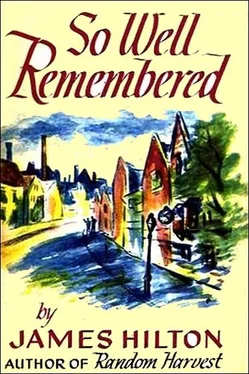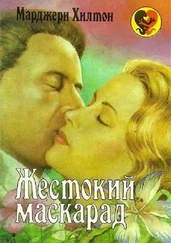Джеймс Хилтон - So Well Remembered
Здесь есть возможность читать онлайн «Джеймс Хилтон - So Well Remembered» весь текст электронной книги совершенно бесплатно (целиком полную версию без сокращений). В некоторых случаях можно слушать аудио, скачать через торрент в формате fb2 и присутствует краткое содержание. Год выпуска: 1945, Жанр: Проза, на английском языке. Описание произведения, (предисловие) а так же отзывы посетителей доступны на портале библиотеки ЛибКат.
- Название:So Well Remembered
- Автор:
- Жанр:
- Год:1945
- ISBN:нет данных
- Рейтинг книги:5 / 5. Голосов: 1
-
Избранное:Добавить в избранное
- Отзывы:
-
Ваша оценка:
- 100
- 1
- 2
- 3
- 4
- 5
So Well Remembered: краткое содержание, описание и аннотация
Предлагаем к чтению аннотацию, описание, краткое содержание или предисловие (зависит от того, что написал сам автор книги «So Well Remembered»). Если вы не нашли необходимую информацию о книге — напишите в комментариях, мы постараемся отыскать её.
So Well Remembered — читать онлайн бесплатно полную книгу (весь текст) целиком
Ниже представлен текст книги, разбитый по страницам. Система сохранения места последней прочитанной страницы, позволяет с удобством читать онлайн бесплатно книгу «So Well Remembered», без необходимости каждый раз заново искать на чём Вы остановились. Поставьте закладку, и сможете в любой момент перейти на страницу, на которой закончили чтение.
Интервал:
Закладка:
George saw Stoneclough as a symbol of that assumption, and—because the house was now empty and derelict—as a hint that such permanence would have received its virtual death-blow in 1914, even apart from the special fate of the Channings. Only the gardens had any surviving life, the shrubs growing together till they made an almost unbroken thicket around the house, the fences down so that any straggler from the clough could enter the once-sacred precincts out of curiosity or to gather fuel for a picnic fire. All the windows were broken or boarded up; everything loot-able from the interior had long ago been looted. Yet the fabric of the house still stood, too massive to have suffered, and in moonlight and from a distance almost beautiful. George wondered, not for the first time, what could be done with such a property. No one would buy it; no one who could afford repairs and taxes would want to live there or anywhere near Browdley, for that matter. Once or twice he had thought of suggesting that the Council take it over for conversion into a municipal rest-home, sanatorium, or something of the kind —but then he had cautioned himself not to give his opponents the chance for another jibe—that he had made Browdley buy his wife’s birthplace.
He did not walk up to the house, but turned back where the road began its last steep ascent; here, for a space of a few acres, were the older relics —the original Channing Mill, the broken walls of cottages that had not been lived in for a hundred years. George never saw them without reflecting on the iniquity of that early industrial age—eight-year-old children slaving at machines for fourteen hours out of the twenty-four, sunlight falling on the tree- tops in the clough as later on rubber forests of the Congo and the Amazon. Thus had the first Channings flourished; and it might be Nemesis, of a kind, that had given their grand house to the bats and the rats. But its quality showed even in ruin; it was a substantial ruin.
By four o’clock George was back in Browdley, tired and a little footsore. As he turned into Market Street and fished in his pocket for the door-key there came a voice from the pavement near his house: “‘Ow do, George. Nice night—but I’d rather be in bed all the same.”
“Aye,” answered George mechanically. Then, recognizing the policeman on his beat, a friendly fellow always ready with a joke and (at election times) with a vote, George pulled himself together and made the necessary response: “How do, Tom?”
“Fine, thanks—bar a touch of rheumatics… I was at the stone- layin’. It’s bin a grand day for ye, and I wouldn’t say ye don’t deserve it.”
“Thanks, Tom.”
“Ye’ve worked for it hard enough. I can remember when ye used to swear ye’d have those Mill Street houses pulled down, and folks’d laugh at ye then, but I’ll bet they can see it’s no joke now. Aye, ye’ve made a grand start. How long d’you reckon the whole job’ll take?”
“Years,” George answered (but he would have been shocked if he could have been told how many). His voice was rather grim, and he did not amplify as he usually did when anyone encouraged him to discuss his plans. Tom noticed this and muttered sympathetically: “Well, I’ll be gettin’ along—mustn’t keep you talkin’ this hour… ‘Night, George—or rather, good mornin’.”
George fumbled the key in the lock and re-entered his house. He felt, as he had hoped, exhausted, but not, as he had also hoped, insensitive to the alone-ness. It flew at him now like a wild thing as he strode along the lobby and heard, in imagination, Livia’s call from upstairs that had so often greeted him when he came home late from meetings—“That you, George?” Who else did she expect it to be, he would ask her waggishly, and feel sorry that she was such a light sleeper, since his meetings were so often late and the late meetings so frequent…
He went to the kitchen and made himself a cup of tea, sitting there at the small scrubbed table till dawn showed grey through the windows; then he went to the room with the books in it which he called his ‘study’. The time-table lay open on the desk, reminding him of the impending journey for which his tiredness now gave him even physical distaste; and next to the time-table was the small pile of letters that Annie had brought in during the interview with Winslow. George glanced through them idly, and with equal distaste. Suddenly then his glance changed to a gaze and his gaze to a stare, for the writing on one of the envelopes was Livia’s and the postmark was Vienna.
He read it through, and through again, stumbling to his armchair with the alone-ness all around him as he faced the issue. Time passed in a curious vacuum of sensation; he did not realize it was so long until he saw the sunlight brightly shining, glinting already on the gilt titles of his books. Then he crossed the room to his desk and reached for pen and paper.
He wrote out a wire first of all: “Regret must cancel Vienna trip for reasons will explain fully in letter.”
Then he wrote the letter without pause as follows:
“DEAR LORD WINSLOW—By now you will have got my wire, and are probably surprised by my change of mind. The reason for it is simply that I have just read a letter from my wife. It came yesterday—actually while you and I were discussing things. I put it aside with other letters and only noticed it an hour ago. Though short, it is a very frank letter, and in view of what it says there seems little that I can do now—except what Livia asks. I do not pretend to understand how these things happen, and why, but I have to take into account her age, which was not much more than half mine when I married her, so that if it was a mistake, I’d blame myself more than her. Anyhow, it would be unjust and stupid to expect her to cling to it for the rest of her life. Maybe she is old enough now to know what she really does want, and if your son is also, I won’t stand in their way—no, I CAN’T—neither on moral grounds nor for social and professional reasons such as you might have. So there’s nothing I could do in Vienna except make the whole thing more troublesome for all concerned. Please excuse what may strike you as a hasty reconsideration and perhaps even the breaking of a promise, but I’ve already thought it all over as much as a thing like this can be thought over. As for what I feel, that matters to no one except myself, but I would like to say how deeply I appreciate the way you approached me yesterday. No one could have been kinder and I shall never forget it.—Yours sincerely, GEO. BOSWELL.”
George always signed himself ‘Geo.’ in important or official letters because that was how Will Spivey set up his business letter- heads— ‘Geo. Boswell, Printer and Bookbinder’. And under that, in smaller type: ‘Proprietor of the Guardian Press, Market Street, Browdley’. And under that, in even smaller type: ‘Estimates Free. Good Work Guaranteed.’
About seven o’clock he went to the corner, posted the letter, and re-entered his house to find that Annie had returned from spending a night with her mother across the town and had already noticed his bag half packed on the bed upstairs. “ANOTHER conference?” she exclaimed. “Why, it’s only last week-end you was away at the last one…”
“It’s cancelled,” George answered. “I’m not going after all.”
“Then I’ll unpack your things and have breakfast ready in a jiffy.”
George was suddenly aware that he had none of his usual healthy early-morning appetite, but she was in the kitchen before he could say so, and by the time he followed her there he had decided he might as well say everything else that had to be said and get it over.
Читать дальшеИнтервал:
Закладка:
Похожие книги на «So Well Remembered»
Представляем Вашему вниманию похожие книги на «So Well Remembered» списком для выбора. Мы отобрали схожую по названию и смыслу литературу в надежде предоставить читателям больше вариантов отыскать новые, интересные, ещё непрочитанные произведения.
Обсуждение, отзывы о книге «So Well Remembered» и просто собственные мнения читателей. Оставьте ваши комментарии, напишите, что Вы думаете о произведении, его смысле или главных героях. Укажите что конкретно понравилось, а что нет, и почему Вы так считаете.










